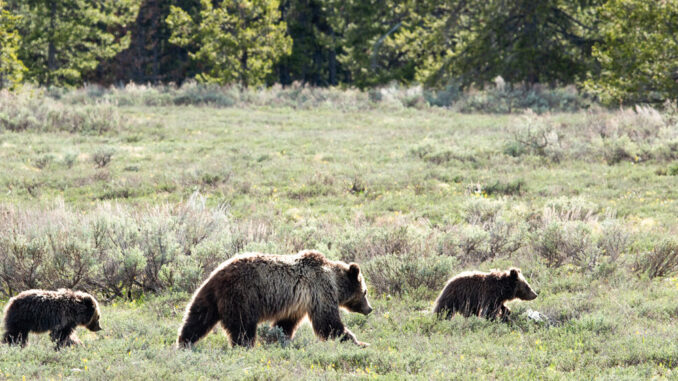
Shayne Patrick Burke was on a short hike this month to photograph owls in the backcountry of Grand Teton National Park in Wyoming when he spotted a grizzly bear cub about 50 to 70 yards in front of him.
Instantly, Mr. Burke knew that the cub’s presence signaled trouble, he wrote on Instagram.
Moments later, Mr. Burke, 35, was attacked by the cub’s mother.
He turned his back, got on his stomach and locked his hands behind his neck, following advice he had read about grizzly bear attacks, he said.
During the attack, on May 19, the bear repeatedly bit Mr. Burke and picked him up and slammed him to the ground, before, he wrote, one of his screams “unfortunately, but fortunately, turned her attention to my head.”
It was a terrifying moment, but it ultimately saved his life.
The bear bit at Mr. Burke’s neck, but his hands and arms were still interlocked behind it and, crucially, he had grabbed a can of bear spray when he saw the cub.
“I never let go of the bear spray can,” he wrote. “As she bit my hands in the back of my neck she simultaneously bit the bear spray can and it exploded in her mouth.”
The explosion scared the bear away.
Mr. Burke, a disabled veteran in the Army Reserve, said that the attack was “the most violent” thing he had experienced, adding, “I’ve experienced being shot at, mortared and I.E.D. explosions.”
Grand Teton National Park said that Mr. Burke, who was visiting from Massachusetts, was discharged from a hospital on Monday and was expected to make a full recovery.
The park said that the attack appeared to be a defensive action by the bear, which was responding to a “surprise encounter.” The bear has not been identified and Grand Teton said that no further “management action,” which could include euthanizing the bear, was required.
On Instagram, Mr. Burke wrote that he had asked the park rangers not to kill the bear because he understood that she was defending her cub.
He said that the attack was a “wrong place, wrong time” situation. He had planned to take an hourlong walk in the hopes of spotting a great gray owl to photograph.
He said the attack happened about 90 minutes after he left the parking lot. He was trying to get back as quickly as possible because he knew his wife had expected him there earlier.
He said he had an “uncomfortable feeling” as he was winding through a thick, wooded valley. He followed safety guidance for the situation and made noise.
“I was breaking branches, singing and talking to myself aloud,” he said.
He had unholstered his bear spray after seeing the cub but the mother was already charging at him. Mr. Burke said that he heard the bear run away after it bit the can of spray.
After Mr. Burke distanced himself from the bear, he called his wife. She helped him figure out how to use the supplies he had, including straps from his backpack and camera bag, to make tourniquets around his legs.
He could tell that he had avoided a ruptured artery, the most dangerous and urgent type of bleeding.
“I laid alone in the woods gripping my knife with my back to a tree just hoping the bear wasn’t to return,” Mr. Burke wrote.
He also called 911, which was able to triangulate his location for a helicopter rescue.
Mr. Burke said that he thought he was going to die and had recorded a video telling those close to him that he loved them.
The first park rangers to reach Mr. Burke provided emergency medical care before he was airlifted to an ambulance. Mr. Burke said that he had surgery to clean and staple his wounds.
He described himself as being poorly prepared for a medical emergency because he had meant to take a short walk through roadside woods. Usually, he said, he carries a first aid kit.
Mr. Burke said that the top things that kept him alive were that he had previously read about what to do in case of a bear attack and that he was carrying bear spray that he knew how to use.
People are advised to play dead and lock their hands behind their neck, just as Mr. Burke did, in the event of a grizzly bear attack. If a black bear attacks, do not play dead.


Be the first to comment